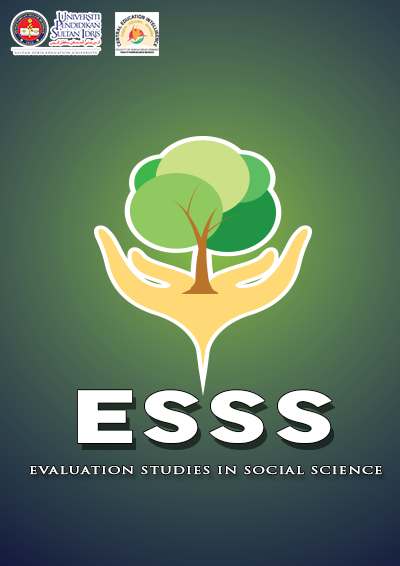Pandangan Pelajar terhadap Program Intergenerasi untuk Warga Emas
Student’s Perception on the Intergenerational Programs for the Elderly
DOI:
https://doi.org/10.37134/esss.vol1.2.3.2020Keywords:
Program Intergenerasi, warga emas, pelajar sekolahAbstract
Program Intergenerasi digunakan sebagai usaha untuk mengurangkan masalah jurang antara generasi. Tujuan kajian ini dijalankan adalah untuk mengetahui pendapat pelajar terhadap Program Intergenerasi yang telah dilaksanakan di sebuah sekolah menengah di negeri Selangor. Sampel kajian terdiri daripada 10 orang pelajar tingkatan dua dan 6 orang warga emas yang dipilih secara rawak. Soalan temubual bagi kajian ini disediakan oleh penyelidik dan kemudian dikesahkan oleh tiga orang pakar sebelum digunakan. Secara keseluruhannya, dapatan menunjukkan para pelajar berpuas hati terhadap lokasi yang dipilih, masa yang diperuntukkan untuk program serta aktiviti dalam program tersebut. Mereka juga mempunyai pandangan yang positif terhadap warga emas. Kajian ini membuktikan bahawa Program Intergenerasi memberikan faedah kepada para pelajar untuk lebih mengenali warga emas. Selain itu, kajian ini juga boleh dijadikan sebagai rujukan dari segi jenis aktiviti, lokasi dan masa yang bersesuaian untuk perancangan program pada masa akan datang.
Intergenerational programs are used as an effort to reduce the problem of intergenerational gaps. The purpose of this study is to find out the opinion of students on the Intergeneration Program that has been implemented in a secondary school in the state of Selangor. The study sample consisted of 10 form two students and 6 senior citizens who were randomly selected. The interview questions for this study were prepared by the researchers and then verified by three experts before being used. Overall, the findings showed that the students were satisfied with the chosen location, allocated time for the program as well as activities in the program. They also have a positive view on senior citizens. This study proves that the Intergeneration Program provides benefits to students to get to know senior citizens better. In addition, this study can also be used as a reference in terms of the type of activity, location and time that are suitable for future program planning.
Keywords: Intergenerational program; senior citizens; school students
Downloads
References
Alavi, K. (2012). Dilema penjagaan ibu bapa tua. Bangi: Penerbit Universiti Kebangsaaan Malaysia.
Chorn Dunham, C. & Casadonte, D. (2009). Children’s attitudes and classroom interaction in an intergenerational education program. Educational Gerontology, 35(5), 453–464.
Ezrol, T. (2012). Intergenerational program participation: A case study. [Master’s thesis, San Francisco, State University]. ProQuest Dissertation and Theses Global.
Gamliel, T., Reichental, Y. & Ayal, N. (2007). Intergenerational educational encounters: part 1: a model of knowledge. Educational Gerontology, 33(1), 1–22.
Jabatan Perangkaan Malaysia (2020). Unjuran penduduk. Kuala Lumpur: Jabatan Perangkaan Malaysia.
Larkin, E., & Newman, S. (1997). Intergenerational studies: A multi-disciplinary field.I In K.Brabazon & R.Disch (Eds.), Intergenerational approaches in aging; Implications for education, policy and practice. New York, NY: Haworth Press.
Ngu, K.S. (2016). Pembangunan Modul Kurikulum Intergenerasi Berasaskan Perkongsian Kemahiran. Tesis Ph.D, Universiti Malaya, Kuala Lumpur.
Ngu, K.S, Siraj, S. & Alias, N. (2020). Program Intergenerasi untuk Kesejahteraan. Kuala Lumpur: Penerbit Universiti Malaya.
Parisi, J. M., Rebok, G. W., Carlson, M. C., Fried, L. P., Seeman, T. E., Tan, E. J. & Piferi, R. L. (2009). Can the wisdom of aging be activated and make a difference societally? Educational Gerontology, 35(10), 867–879.
Powers, M., Gray, M. & Garver, K. (2013). Attitudes toward older adults: Results from a fitness-based intergenerational learning experience. Journal of Intergenerational Relationships, 11(1), 50–61.
Robinson, T., Zurcher, J. & Callahan, C. (2015). Youthful ideals of older adults: an analysis of children’s drawings. Educational Gerontology, 41(6), 440–450.
Santini, S., Tombolesi, V., Baschiera, B. & Lamura, G. (2018). Intergenerational programs involving adolescents, institutionalized elderly, and older volunteers: results from a pilot research-action in Italy. BioMed Research International, 2018(1), 1- 14.
Thompson, E. H. & Weaver, A. J. (2016). Making connections: the legacy of an intergenerational program. Gerontologist, 56, 909–918.
Weaver, A. (2014). Bridges: growing older, growing together. Journal of Intergenerational Relationships, 12(2), 197–201.
Downloads
Published
Issue
Section
License
Copyright (c) 2023 Kee Shing Ngu, Saedah Siraj, Norlidah Alias

This work is licensed under a Creative Commons Attribution-NonCommercial-ShareAlike 4.0 International License.


